Forex vs. crypto: Which to choose?
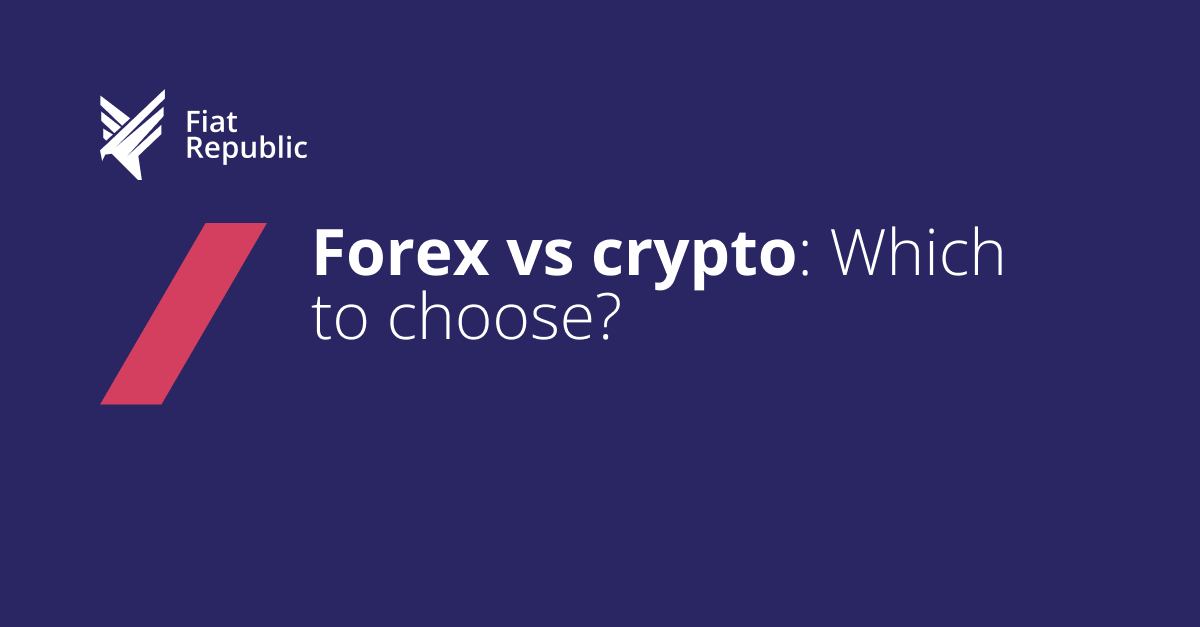
In today’s financial landscape, there are many markets to choose from, two of which are forex (foreign exchange) and cryptocurrency. Forex is a far more established market. Additionally, most forex activity is done by experienced traders, whereas crypto is both a nascent market and a mix of institutional and retail investors. In the case that individuals use forex, it is often either once off in small to mid-sized transactions, for activities such as travel, or taken out as a hedge against exposure to any given currency. It can nonetheless be a speculative market, not to the same extent as crypto. On the other hand, the cryptocurrency market typically involves taking on a lot of risk for a more significant upside potential.
Related:
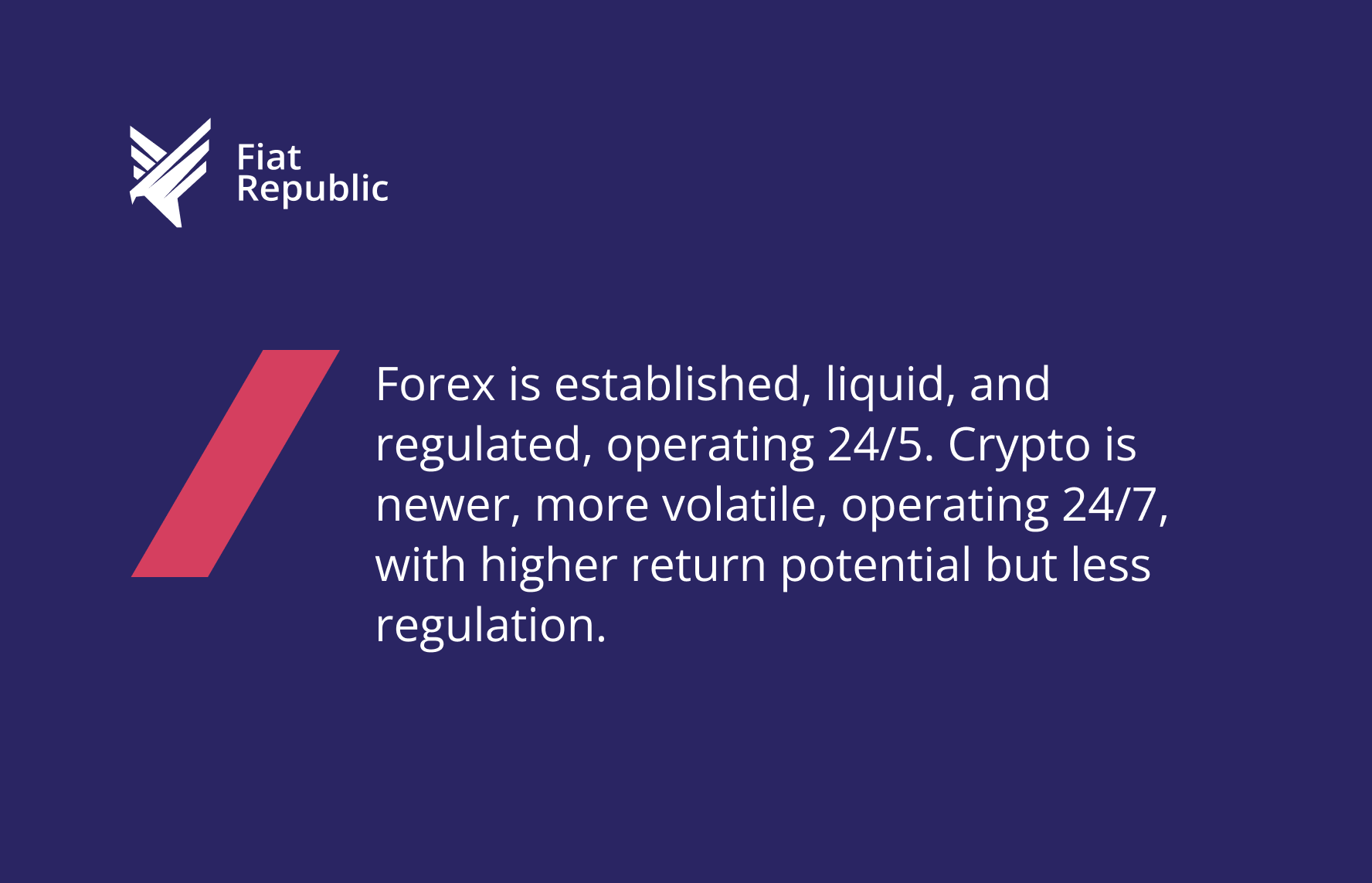
What is forex trading?
Forex trading means exchanging one currency for another in the foreign exchange market. With daily trading volumes of over $6 trillion, it’s the largest financial market in the world. Forex operates 24 hours a day, five days a week, and traders can speculate on the relative value of currency pairs.
There are several important aspects of forex trading. All trades are based on currency pairs like EUR/USD or GBP/JPY. Leverage allows a trader to hold a large position for a relatively small capital, and pips represent the smallest unit of price movement. Margin requirements and standardized lot sizes are equally important issues in forex trading. The combination of these features results in a market that attracts institutional and retail investors alike, thanks to liquidity, constant access, and profit potential in different market conditions.
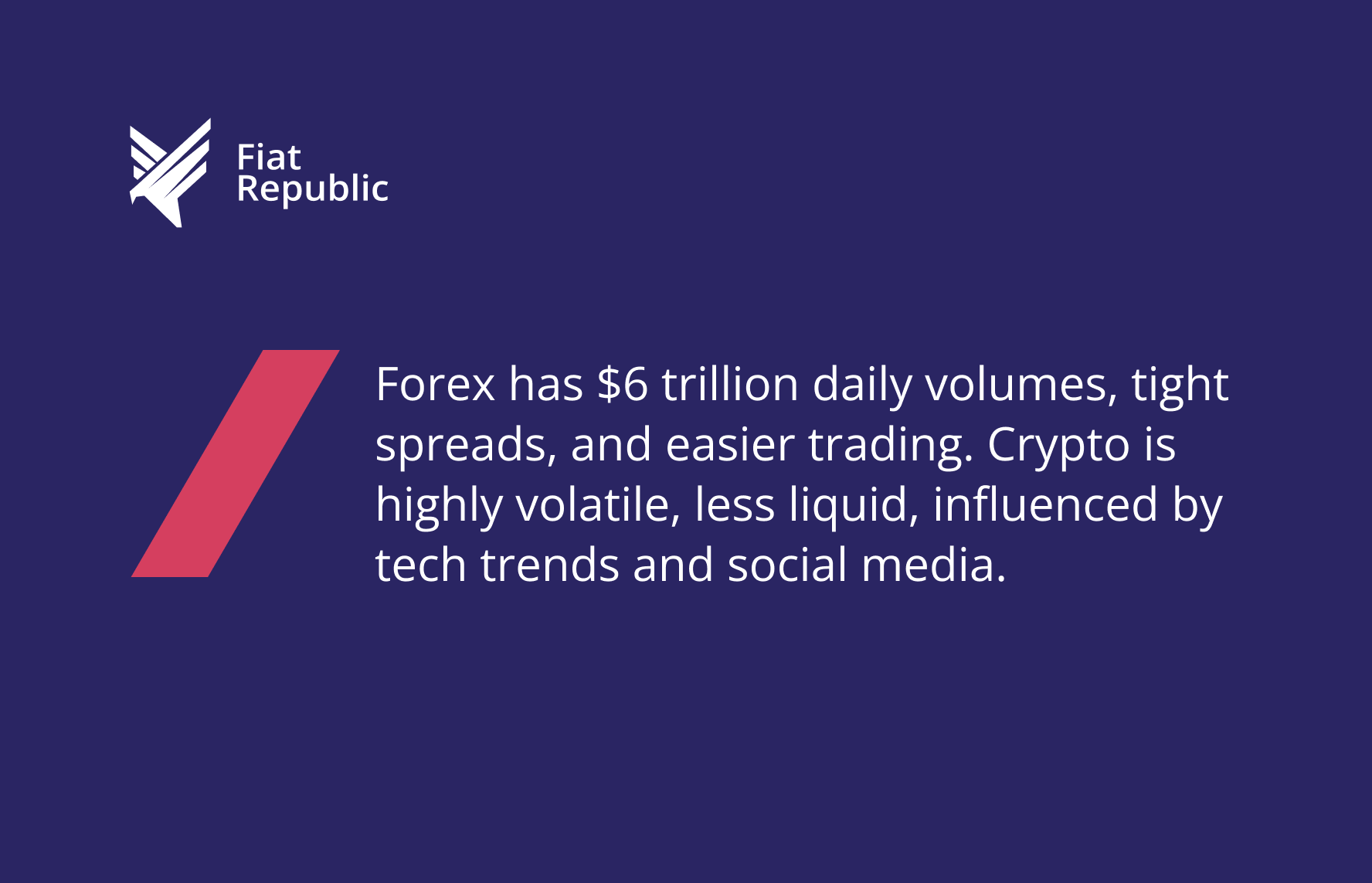
What is crypto trading?
Cryptocurrency trading is the act of buying and selling digital currency that is based on blockchain technology. Financial institutions, such as commercial banks, central banks, and investment firms, play a significant role in influencing market dynamics and currency transactions within the crypto market. Unlike conventional currency, cryptocurrencies are stateless and do not have a central administrator. Well-known coins such as Bitcoin (known as digital gold) and Ethereum (smart contract capabilities) dominate the crypto market. The most common form of crypto for settlement and liquidity between exchanges and traders is stablecoins. Stablecoins are fiat currency denominated, the most common being USDT and USDC, which are dollar-denominated.
Crypto trading occurs on different exchanges that run 24/7 (although deposits and withdrawals follow typical banking requirements), where people can purchase, sell, and sometimes stake their digital assets. Innovative, high-volatility, and with the potential to generate significant returns, this market is attracting a new generation of investors and traders.
Key differences between forex and cryptocurrency markets
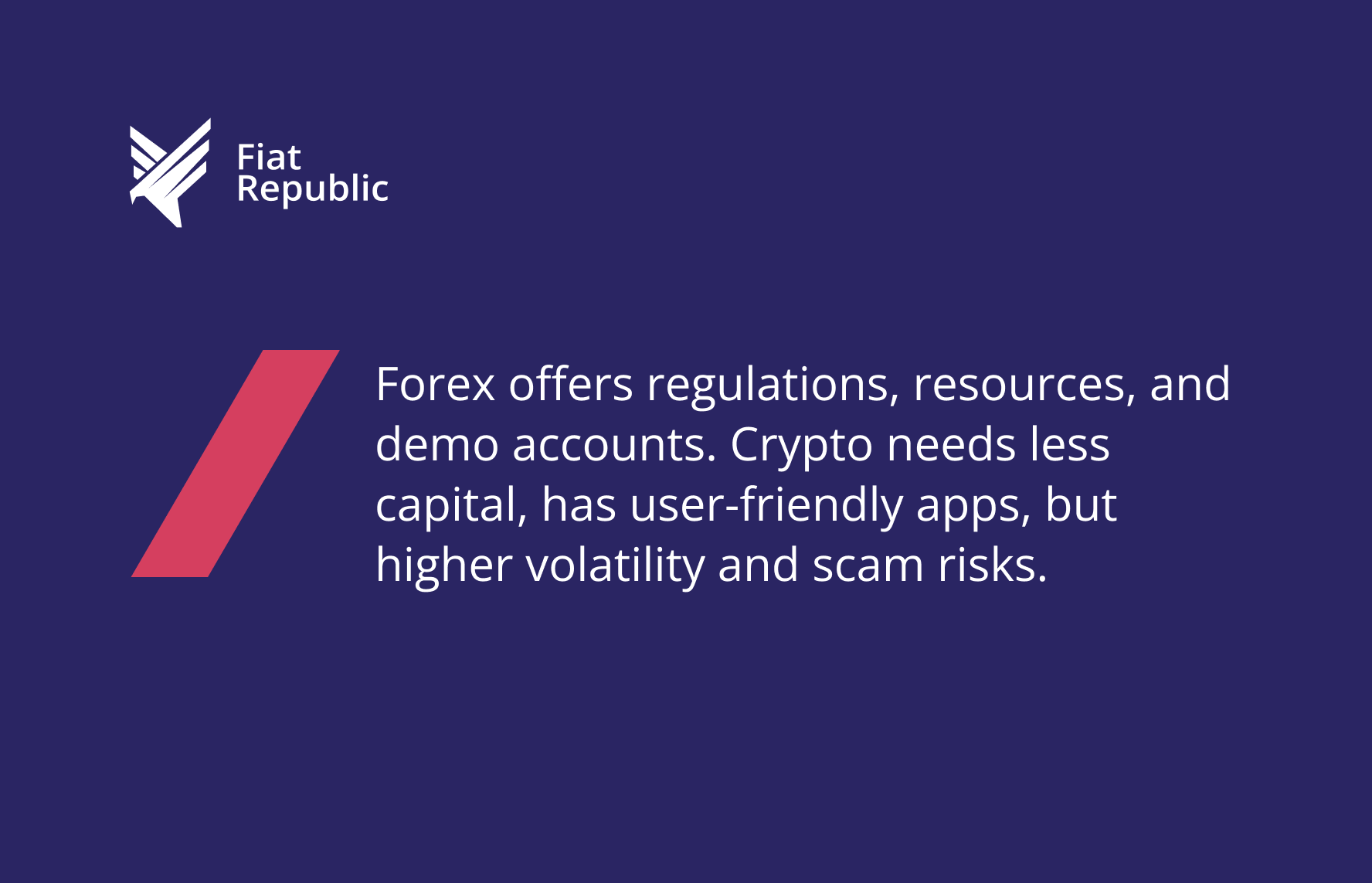
Financial markets encompass platforms for trading and speculating on currency values, and there are many differences between the forex and crypto markets. Forex has greater liquidity and market size, while cryptocurrencies have higher volatility. Forex runs 24/5, while crypto markets run 24/7. Forex is heavily regulated, while crypto regulations are widely different by jurisdiction.
The two markets also diverge in terms of price influences. Economic indicators and geopolitical events affect forex, while cryptocurrency prices mostly react to technological developments and adoption rates. Also, the participant base is different. Forex has banks, corporations, and traders, while crypto is more retail-driven and with growing institutional interest.
The most fundamental difference may be in the underlying technology. Forex works on traditional financial infrastructure, whereas cryptocurrency runs on blockchain technologies, with unique features such as being decentralized and immutable (with exceptions).
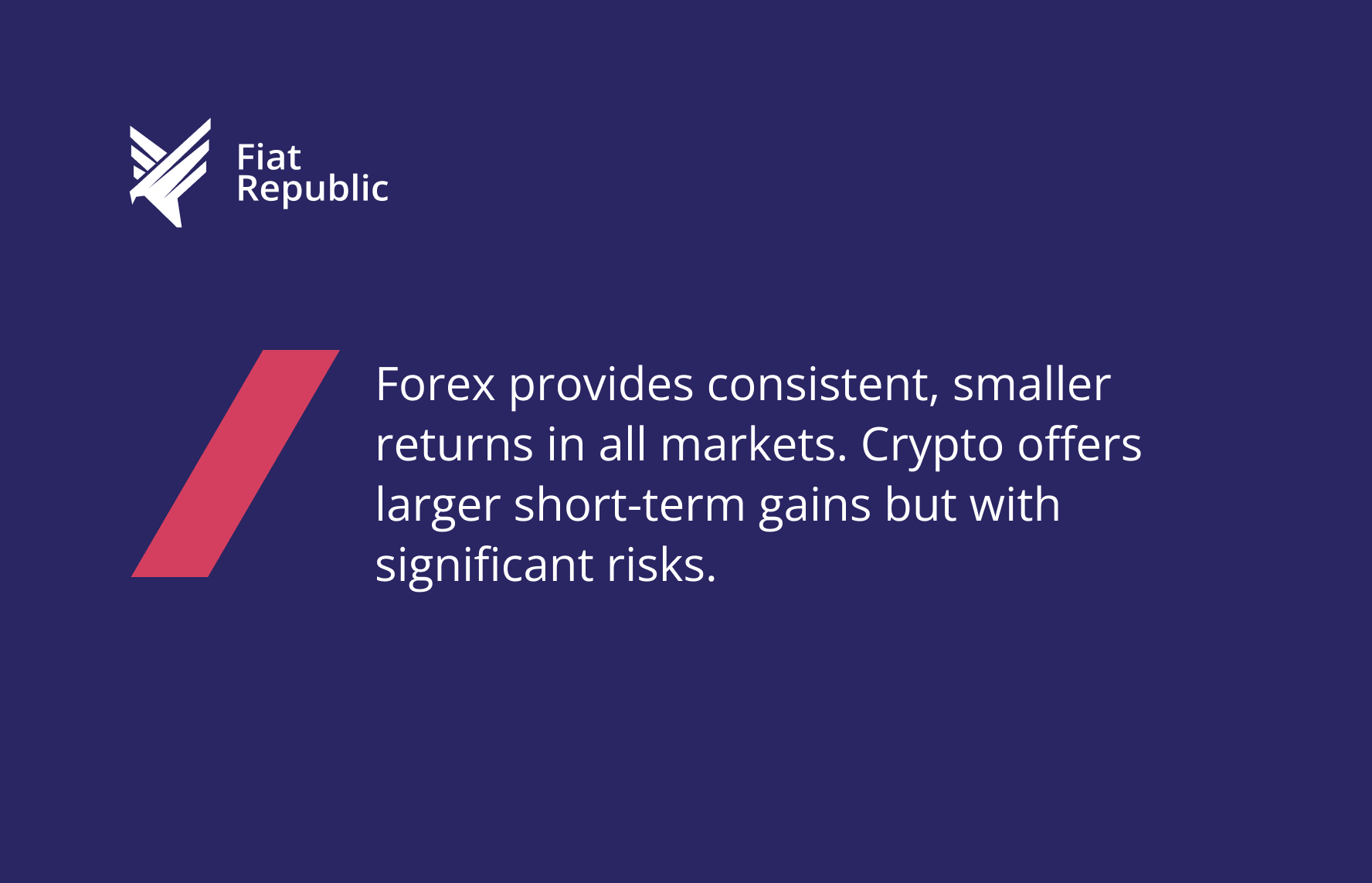
Is crypto or forex better for beginners?
Forex and crypto trading are fundamentally different for beginners. However, forex has a more established environment, superior educational resources, regulated markets, and demo accounts that you can use for practice. It’s also less volatile, which can be less stressful for new traders. Forex, however, requires a complex understanding of global economic factors and high-leverage risks.
Conversely, crypto trading usually requires lower capital and has user-friendly mobile apps that make it easier for newcomers. The crypto market can be exciting for beginners but also innovative. It does have its challenges, though, in the form of large volatility and not much regulation, and you need to know the ins and outs of blockchain technology to judge quality between projects. Likewise, inexperienced traders need to be careful about scams that crypto markets are more prone to.
For starters, whether you should use forex or crypto depends on your personal risk appetite, what you enjoy doing, and your learning style. On the one hand, forex is a known entity and may provide some comfort for those looking to try their speculative hand in the forex markets. As a retail client, it is also much easier to get exposure to it through a fund or bank.
Market characteristics and risks
When comparing forex and crypto markets, it’s essential to understand their unique characteristics and associated risks. Forex markets are renowned for their high liquidity, with daily trading volumes exceeding $6 trillion. This immense liquidity results in tight spreads, making it easier for traders to enter and exit positions without significant price changes. However, forex markets are not immune to volatility. Exchange rate fluctuations can be influenced by a myriad of factors, including economic indicators, political events, and decisions made by central banks.
On the flip side, crypto markets are characterized by their high volatility. Prices can experience dramatic swings within short periods, driven by factors such as social media trends, technological innovations, and adoption rates. The relatively lower liquidity in crypto markets compared to forex can exacerbate this volatility. Additionally, the lack of comprehensive regulation and oversight in the crypto space can lead to rapid and unpredictable price movements.
For retail traders in the forex market, leverage is a double-edged sword. While it allows traders to control larger positions with a smaller capital investment, it also amplifies potential losses if the market moves unfavorably. Forex brokers often offer high leverage, which can be enticing but requires careful risk management.
In contrast, crypto trading typically involves lower leverage but comes with higher price volatility. Crypto brokers may charge spreads and commissions, along with additional fees for withdrawals and deposits. Security is another critical concern in the crypto market, with risks of hacks, security breaches, and vulnerabilities in exchanges or blockchain networks.
Understanding these market characteristics and risks is crucial for traders to develop effective strategies and manage their investments wisely.
Security and regulation
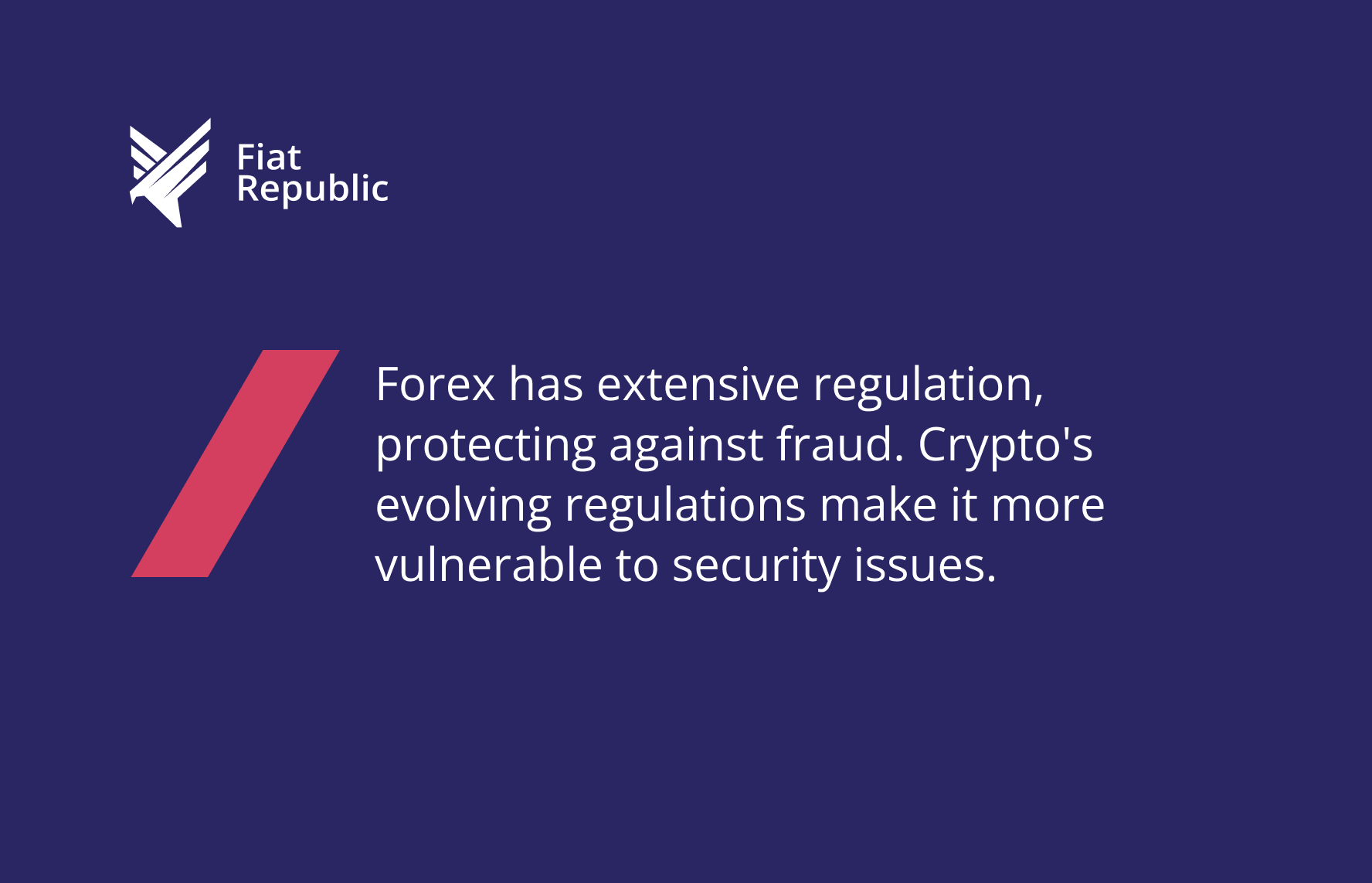
Security and regulation are pivotal factors to consider when trading in the forex and crypto markets. Forex markets benefit from extensive regulation, with established regulatory bodies in most countries overseeing the industry. This regulatory framework provides traders with a level of protection, ensuring fair market practices and measures to prevent fraud. For instance, in the UK, the Financial Conduct Authority (FCA) regulates forex brokers, while in the US, the Commodity Futures Trading Commission (CFTC) plays a similar role.
In contrast, the regulatory landscape for crypto markets is still evolving. While some countries have implemented regulatory frameworks, others lag behind, potentially exposing traders to higher risks. The decentralized nature of cryptocurrencies and the lack of uniform regulation can make the market more susceptible to fraud and manipulation. Additionally, crypto markets are often targets for security breaches, hacks, and vulnerabilities in exchanges or blockchain networks.
To mitigate these risks, traders should prioritize choosing reputable brokers. Forex brokers should be registered with relevant regulatory bodies, ensuring they adhere to industry standards and practices. Crypto brokers should implement robust security measures, such as multi-layered encryption, two-factor authentication, and cold storage for digital assets. Traders should also be vigilant against phishing scams, malware, and other cyber threats.
Ultimately, the choice between forex and crypto trading hinges on individual circumstances, including risk tolerance, investment goals, and desired level of control. By understanding the market characteristics, risks, security, and regulatory considerations, traders can make informed decisions and develop effective trading strategies. Whether you lean towards the structured environment of forex or the innovative potential of crypto, being well-informed is key to navigating these dynamic markets successfully.
Advantages and disadvantages of forex
Forex trading has many advantages, such as high liquidity, low transaction costs, and a 24-hour market (five days a week). However, there are challenges. The market is complex and influenced by many factors, making it easy to manipulate. Trading currency pairs, such as EUR/USD and GBP/JPY, is a fundamental aspect of Forex trading, but it is also fast-paced, stressful, and requires a lot of focus. On the other hand, it is not necessary to trade forex yourself, and you can get exposure through multiple avenues.
Advantages and disadvantages of cryptocurrencies
On the other hand, cryptocurrencies genuinely are a 24/7 market. Blockchain technology offers low barriers to entry. Crypto also gives exposure to financial innovation and portfolio diversification. The high volatility and regulatory uncertainty of the crypto market, however, are well known. Hacks and scams are more common. Additional factors to be taken into account are the limited real-world use cases and environmental concerns associated with some cryptocurrencies. There can be a hurdle to the complexity of technology for newcomers.
Forex trading vs cryptocurrency: Which is more profitable?
Forex and crypto markets are profitable with the right market conditions, a good trading strategy, proper risk management, and skills. Profit returns from forex can be more consistent, and you can earn in both rising and falling markets, but they are usually smaller. Forex leveraged trading can magnify profits and losses. Generally, economic factors and technical analysis produce a more predictable market.
However, crypto trading could be hugely profitable but with more significant risks. This higher volatility means you can make larger short-term gains, and if you adopt new coins or tokens early enough, you can make a lot of money. In the crypto space, additional income streams, such as staking and yield farming, are unique. But again, each protocol has risks, so careful research is always required.
Trading mechanics
Forex and crypto markets have different trading mechanics. Forex trading concerns currency pairs, pips, standardized lot sizes, leverage, and margin. Spreads and overnight position rollovers are the primary cost considerations. Meanwhile, crypto trading works on exchanges and digital wallets with the blockchain as a technology base. Gas fees are often involved in transactions while backing up the network, and rewards can be earned through staking.
Can you trade crypto like forex?
If you are faced with the decision between forex and crypto trading, consider your risk tolerance, capital available, time you can commit, and technical knowledge. Your comfort with regulatory environments and your long-term view of traditional versus digital currencies should also influence your decision. Both markets support several types of trading styles: day trading and long-term holding.
It’s important to research both markets, try using demo accounts or paper trading, and begin with small amounts of real money before taking the plunge. Continuously learn about what is happening in the market, and be honest about your financial goals and risk tolerance.
Conclusion
Opportunities and challenges are unique to forex and cryptocurrency trading. If you’re looking for a more traditional experience with high liquidity and established regulations, forex is the way to go. However, if you want exposure to the latest financial technology and the potential for high returns, cryptocurrencies are the way to go, but with increased volatility and regulatory uncertainty.
Your decision will depend on your situation, financial objectives, risk tolerance, and market interests. There are enough similarities between the two markets that, with continuous learning, disciplined strategy execution, and risk management, you have the potential to be successful in either market. If you plan to put large amounts of capital behind it, make it a point to know everything and get the hang of it with a practice account. Start with the real dough on a small scale before you take the plunge.
Adaptability and openness to new information will be key to long-term success as both markets evolve. Whether you choose forex, crypto, or both, trading should be done with patience, diligence, and a commitment to lifelong learning. This guide is an overview, but markets can change quickly. The decisions are always based on your research, and you may even consider advice from financial professionals.
Frequently Asked Questions
Is crypto better than forex?
Crypto and forex, both have their pros and cons, so it’s hard to say that one is better than the other. When it comes to crypto vs forex, the choice is based on an individual’s risk appetite, investment goals and knowledge of the market.
Can you trade crypto like you would forex?
Cryptocurrencies can be traded in pairs like forex, speculating on the relative value changes between two different cryptocurrencies or between a cryptocurrency and a fiat currency, yes. However, crypto markets are open 24/7 and more volatile than traditional forex markets, so different strategies and risk management are needed.
Which is better for beginners, crypto or forex?
For beginners, Forex can be considered better because it has a well-established regulatory framework, lower volatility, and many educational resources. Crypto is, however, more appealing to some beginners because of lower barriers to entry and higher returns potential, but with higher risk.
Which is more profitable, forex or crypto?
Forex vs. crypto trading profitability can vary depending on market conditions, trading strategies, and individual skills. Crypto markets have the potential to provide higher returns in shorter periods but with higher risks and volatility. In comparison, forex provides more consistent but generally lower returns with potentially lower risk.
Read more



